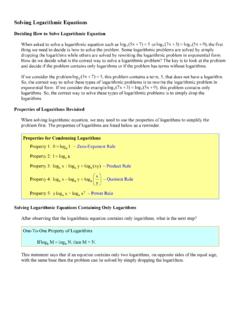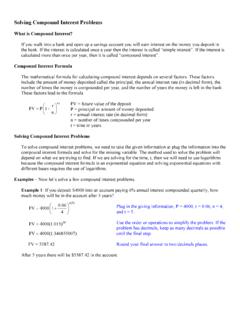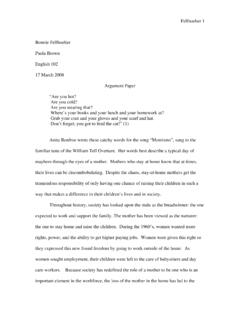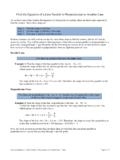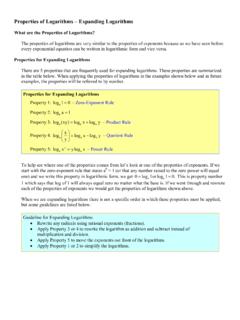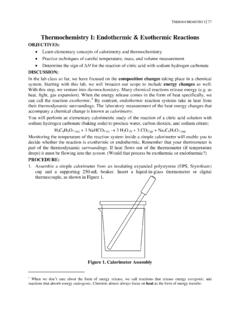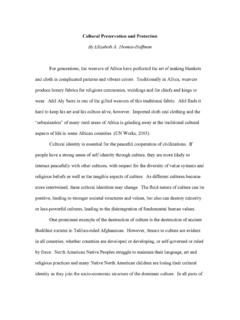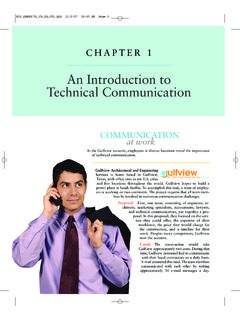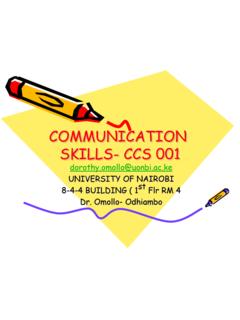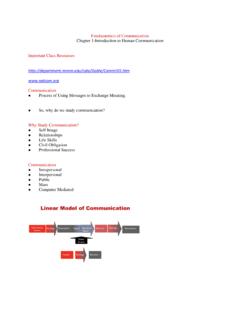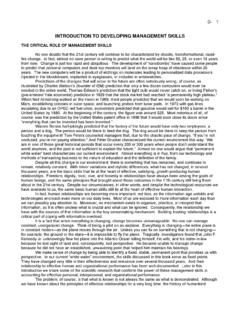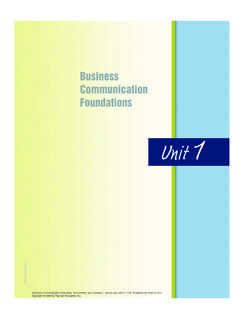Transcription of Introduction to Human Communication Course Syllabus
1 Introduction to Human Communication Course Syllabus Spring Semester, 2006 COM100-Section 3542 , MWF 8:00-8:50am, Room V117 COM100-Section 3548 , MWF 9:00-9:50pm, Room V117 COM100-Section 3567 , TR 7:30-8:45pm, Room V117 COM100-Section 3568, TR 9:00-10:15pm, Room V117 Course Description The purpose of this Course is to help you to understand the principles of Communication theory and to begin to put them into practice in your life. You will learn skills and techniques essential to effective Communication in settings that include: intrapersonal (with yourself), interpersonal (face-to-face), small-group (face-to-face with a few), and public speaking (one to many). You will apply these skills and techniques through practical exercises that will enable you to incorporate them into your daily life. Speech is an extension of your personality. You can develop maturity and experience relationships that run more smoothly, and friendships can become more meaningful. You will learn to function more effectively and assertively in public and work environments and develop a newfound ability to speak up effectively when you want to.
2 Assignments and Course Schedule Section Instructor Bruce A. Peterson Office: Palo Verde Building #P248 Telephone: 480-654-7722 Office Hours: MTWRF 11:00-12:00am or by appointment. See Daily Schedule Homepage: ~vocewld/ E-Mail: (This is the surest means to get my prompt attention.) Course Textbook Joseph A. DeVito, Essentials of Human Communication , 5th ed., Allyn & Bacon, 2001. Additional Reading (Choose only ONE of these books to read) Michael Dues & Mary Louise Brown, Boxing Plato's Shadow: An Introduction to the Study of Human Communication , McGraw-Hill, 2003. Read Book Review Thomas L. Friedman, The World Is Flat : A Brief History of the Twenty-first Century, Farrar, Straus and Giroux, 2005. Read Book Review (This book is not available at the college bookstore. You can find it at a local bookstore, , etc. and may purchase an audio book if you prefer.) (Mr. Peterson reserves the right to drop a student from the class role, anytime during the semester, if he perceives the student is not meeting the Course requirements and/or guidelines set forth in these documents.)
3 Course Objectives By the end of this Course you should be able to: 1.) Develop an awareness and appreciation of the complexities of the speech Communication process; 2.) Understand the principles of Human Communication theory by identifying the elements and interrelationship of the elements in a Communication model; 3.) Expand perception skills, comprehend the effects of self concept on Communication , and understand how meaning is created; 4.) Identify the strengths and weakness of language in our Communication ; 5.) Explain the importance of nonverbal Communication and the value of interpretation of nonverbal messages; 6.) Develop a greater understanding and appreciation of the role of empathy and equality in Human Communication ; 7.) Develop an awareness and the ability to recognize propaganda. 8.) Develop new listening habits and skills and a systematic method of listening behavior; 9.) Develop a personal, constructive approach to dealing with conflict situations through speech Communication strategies of conflict resolution; 10.
4 Practice the principles of effective group Communication , identify the various roles and norms in the group Communication process, and understand the characteristics of leadership; 11.) Practice and understand the benefits and limitations of John Dewey's Reflective Thinking Technique for group problem solving, and; 12.) Demonstrate the art and principles of preparing and delivering an effective public speech. Course Requirements Your accomplishment of the Course objectives will be determined by: 1.) Reading, understanding, and complying with the specific standards and directives listed in this Course Syllabus and any other addenda presented by Mr. Peterson; 2.) Attending class regularly, actively participating in classroom discussion and structured activities, and developing good listening habits when not speaking; 3.) Reading the Course textbook and supplemental material as directed; 4.) Successfully completing all oral and written exercises and assignments as directed; and, 5.
5 Taking the initiative in obtaining whatever information missed when absent. Study time: Most college courses require that students spend a significant amount of time outside of class in individual study time. An often used guideline is to spend two hours per week for every class hour. This means, in a three credit Course , six hours of outside study per week would be expected. The actual in-class meeting time is short in college courses because it is expected that students can and will work independently outside of class in order to meet the requirements of the Course . Course Guidelines You are responsible for comprehending and following the specific standards and policies established for this Course : Attendance Policy: Regular attendance is imperative. You need to be present to learn--by observing and practicing the various skills introduced in the classroom. This is a participation Course . Roll will be taken at the beginning of each class meeting. You will be allowed 3 absences in the MWF class and 2 absences in the TR class.
6 The only official excused absences are for MCC sponsored activities or religious days, but they require advanced written notice. If you are absent when you are to give an oral assignment or presentation you will be given a zero for that exercise -- THERE ARE NO MAKE-UP PRESENTATIONS. You will receive no credit for the class participation portion of your final grade if you have more than 3 MWF or 2 TR absences. You may also be dropped from the class for excessive absences. Late Work Policy: All written work must be turned in on the date it is due whether you are absent or not. Student's grade will be lowered one grade step per class period late on any written assignment. Remember, there are NO late oral assignments. All written work must be typed, double-spaced with 1" margins, and adhere to the principles of college writing. See: "Good Writing or Pet Peeves and Higher Grades". Make-up lecture quizzes must be arranged by the student within a week of the original test date.
7 Classroom Procedure: The process of learning will be cumulative, but the instructor will also endeavor to obtain "gestalt." In each unit of study you will be expected to show a grasp of the essential elements taught in previous units as well as the one under investigation. The instructional style will be balanced between lecture, open discussion, and learning activities. You are expected to behave in a mature, responsible, and professional manner--Keeping an open mind to new ideas and opinions and respecting the values and privileges of all concerned. Just being in the classroom does not satisfy the participation requirement of this Course ! You are expected to be actively involved, verbally and nonverbally, in the various topic discussions and learning activities, showing interest and a willingness to share. Cell Phones, Pagers, Food & Drink: Please turn the sound off on your phone and pager before entering class. Do not talk on your phone during class: I will ask you to leave for the day.
8 School policy does not allow food in the classrooms, and drinks must be in a spill proof container. Disabilities: If you have a disability, including a learning disability, that may have an impact on your work and for which you may require accommodations, please notify the Recourses and Disability Office at 461-7447. I am willing to make reasonable accommodations, so see me as soon as possible to discuss your needs. Examinations and Reading/Lecture Quizzes: There will be an oral Quiz on the last day of the week for each textbook chapter assigned that week. Mr. Peterson will call randomly on two or three class members to respond to one of the week s quiz questions orally in class. An on-line link to each week's possible questions is posted in the Course schedule below. You will not know who will be called upon or what question they will be asked to respond to. Your quiz grades will be determined by how well you answer and respond publicly to the questions posed to you.
9 Each student will be required to respond twice during the semester. Be prepared each week; you do not know when you will be called upon. (See Course Schedule) There will be three (3) Lecture Quizzes over the material covered and highlighted in class, For Lecture Quizzes #1 you will need a scantron - form 882 (Picture of form). You will not be able to take the first quiz without the proper scantron form. There will also be a comprehensive Final Essay Test. Assignments: Choose the Appropriate Assignment for the Book You You Have Chosen to Read: Boxing Plato's Shadow Assignment The World Is Flat Assignment Interpersonal Communication Journal: Journal Assignment Comm. Experiment Paper sample #1 Comm. Experiment Paper sample #2 (Here are some tips for good writing) Good Writing Infosuasion Speech: Speech Assignment Infosuasion Speech Worksheet or Download as Example Outline Speech Evaluation Form or Download as Problem Solving Discussion Group: Small Group Problem Solving Exercise Presentation Evaluation Form Use a computer word processor for all written assignments.
10 Make a copy of all written assignments before turning them in. Also, save your work on a separate disk or data storage device. Grade Computation System: The various assignments\requirements will account for the following percentages of your final overall grade in this Course . Boxing Plato's Shadow or The World is Flat Paper 15%Interpersonal Communication Experiment Journal 15%Speech Presentation 15%Speech Outline and Worksheet 5% Group Problem Solving Presentation 10%Group Problem Solving Individual Participation 10%Reading and Lecture Quizzes 10%Class exercises and Participation 5% Final Written Examination 15%Mr. Peterson will use the following grading system. There will be no exceptions or substitutions to it. Your oral and written work will be assigned a letter grade. The respective values for each letter grade are indicated below. Letter Grade System: A = A- = B+ = B = B- = C+ = C = C- = D+ = D = D- = F = If you have any questions and/or concern about your classroom performances and/or earned grades, please make an appointment to confer with Mr.
